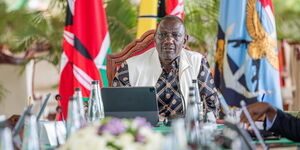As President William Ruto's administration continues with its reforms at the National Health Insurance Fund (NHIF), a number of unemployed Kenyans will pay Ksh1,000 monthly in new proposals.
The National Health Insurance Fund Regulations 2023 aims to improve the quality of healthcare for Kenyans and cover more Kenyans who lack any insurance. At the same time, the proposals aim to make NHIF more self-reliant and efficient.
It is proposed that the monthly contributions be categorised into three sections; unemployed Kenyans, unemployed and vulnerable Kenyans, and employed Kenyans.
Unemployed Kenyans
Kenyans who are not employed will part with Ksh1,000 monthly if it is determined that they are not vulnerable and can make the contributions on their own.
"A contributor who is not employed or listed as an indigent or vulnerable person shall pay a monthly contribution of Ksh1,000," NHIF proposes.
Unemployed and Needy Kenyans
On the other hand, unemployed Kenyans who are considered vulnerable will be fully taken care of by the government.
"The state department responsible for social protection shall submit to the board a list of the indigent and vulnerable persons for whom the National Government is liable as a contributor.
"The amount payable by the National Government on behalf of indigent and vulnerable persons shall be Ksh13,300," read the proposals in part.
Employed and Self-employed Kenyans
Kenyans employed in the formal and informal sectors will pay 2.75 per cent of their gross salary or income to the national fund.
While some Kenyans enjoy reprieve as their monthly deductions will reduce, those who earn above Ksh35,000 will see their monthly contributions increase.
Self-employed Kenyans whose 2.75 per cent of their gross income is less than Ksh300, will have their contributions capped at Ksh300.
"In determining the income upon which a contribution is applicable, the NHIF board may require the contributor to avail such evidence and documentation as the board may consider necessary," the proposals read in part.
Under the proposals, all contributions will be remitted to the Fund by the ninth of every month with late contributions attracting a penalty to be prescribed by the board.
The regulations are set for public participation in the coming months.
Fight Back
However, the regulations have been met with opposition from a number of worker's unions including the Kenya Medical Practitioners Pharmacists and Dentists Union (KMPDU) who opined that deductions will be a burden to a number of Kenyans.
"We cannot subject ourselves to extractive action on workers' payslips," KMPDU Secretary General Davji Atellah stated then.
On his part, Ruto detailed that the reforms will help many Kenyans who lack medical insurance and are struggling to make ends meet.
"It does not make sense that the president pays Ksh1,700 every month and the common citizen pays Ksh600 to have NHIF. My salary is Ksh1 million and the bodaboda earns Ksh700," Ruto explained.












